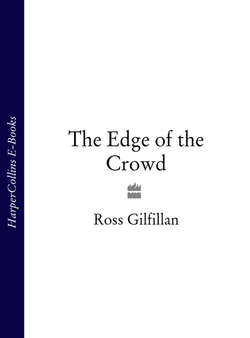Читать книгу The Edge of the Crowd - Ross Gilfillan - Страница 7
III
ОглавлениеBy the Park gates, Rankin fits a new lens upon the camera, into which is inserted the last of the wet collodion plates. They have been ready for the past quarter hour and Rankin is impatient to quit the Park and fill his belly at Simpson’s chop-house. He observes that ‘Simpson’s is very good for their cutlets’ and that ‘their pies is full of meat with no rubbish’, hoping that Touchfarthing will perceive the wisdom of patronising a place of ‘unbeatable value’ and not squander the day’s takings at Alexis Soyer’s grand new establishment at Gore House, the wonders of which the hussar has left ringing in their ears. ‘Now that’s the sort of place we might make useful connections,’ Touchfarthing had said. ‘It’s the sort of place we might waste a lot of money,’ Rankin had replied.
A vendor is crying his wares by the Park gates: ‘Potatoes, all ’ot!!’ and Rankin is debating with himself whether a further economy might be made by expending a couple of pennies there rather than at Simpson’s, when Touchfarthing claps his hands and exclaims, ‘There, we have it now!’ and points towards his magnificent subject. Even Rankin is forced to admit the beauty of the scene before them. Oblique sunlight lends fleeting solidity and sharply defines a thousand sash bars and gracefully curving flights of iron. The roof-lined flags of all nations which fluttered gaily in the morning breeze now hang heavy in the still evening air and nothing distracts from the audacious simplicity of Paxton’s ingenious design.
‘A pity about all those folk cluttering the middle ground,’ Rankin says. ‘Ain’t they got no homes?’
‘They won’t register on the photograph,’ says Touchfarthing. ‘Not so long as they keep moving. Now then, I shall have to lengthen the exposure in this light.’
Touchfarthing removes the lens cover and hold up his pocket-watch, timing the exposure while impressively signalling to all about that here is a photographist going about his work. And indeed, in the ground between lens and Exhibition are many careless strollers who appear to take notice and who, perhaps in their ignorance, believe that their presence at the Great Exhibition is being recorded on a photograph.
‘I think that will suffice,’ Touchfarthing says as he re-covers the lens. ‘Take care with your process, Rankin. I think I shall be pleased with this picture.’
‘Well, let’s ’ave that plate quickly, then,’ says Rankin, ‘while there’s still enough light to make a print.’ Rankin disappears inside his dark-tent while Touchfarthing, succumbing to the fatigue of a long and busy day, climbs upon the wagon and settles himself in the largest of the assortment of chairs. He begins to doze, his heavy jowl supported by a hefty hand, and would at any moment have given himself up to a deep and languorous sleep, had not Rankin shaken his knee. ‘Guv’nor, you an’t going to like this!’ he says, pulling the torpid Touchfarthing from his seat. He follows Rankin to his bottles and dishes and from one of these Rankin extracts a square of paper which drips a new pattern of stains upon his already particoloured unmentionables.
‘Well, what is it?’ asks Touchfarthing irritably. His sleep-bleared eyes descry the unmistakeable shape of the great glasshouse before them. ‘It looks all right?’
‘It ain’t quite there yet. But watch here, by the tree.’ Rankin holds the developing photograph towards the sunlight and before their eyes the gauzy facsimile darkens and sharpens and detail begins to show: the crazing of the bark on an elm bough, individual panes of glinting glass, the folds of a Union flag.
‘What’s that?’ Touchfarthing explodes. He takes himself and the photograph from the dark-tent, the better to examine it by the last rays of the sun. ‘Ruined!’ he says, his focus fixed upon an unexpected element in his composition. In the bottom corner, separating and becoming distinct from the trunk of a great tree, stands the man in the green-tinted spectacles and funereal clothing. Long exposure has, as the photographer predicted, erased every other idler and stroller from the scene. But this one remains. The subject of the photograph now seems not to be the Great Exhibition but rather a wealthy country gentleman showing off his estate.
It is only a photograph. The Great Exhibition is not disappearing tomorrow, when Touchfarthing might, with some inconvenience to himself, return and take another picture. But there is that about the man’s expression, an ironical smile, which seems directed at Touchfarthing himself, that enrages and impels him towards the tree where the man had stood.
‘Watch yourself, guv’nor. It an’t worth getting the apoplexy for,’ Rankin says, as Touchfarthing circumnavigates the tree trunk and scans the vistas beyond for any signs of his uninvited subject. Hot and bothered, he fans himself with the photograph as they walk back to the wagon. ‘What kind of fellow is it, do you think, that stands absolutely stock still in the middle of a park for three minutes? Answer me that, John.’
‘A very peculiar one,’ says Rankin, and looks again at the paper, whose unfixed and evanescent image is disappearing before their eyes, fading away until nothing remains of man, tree or the Great Exhibition itself.
